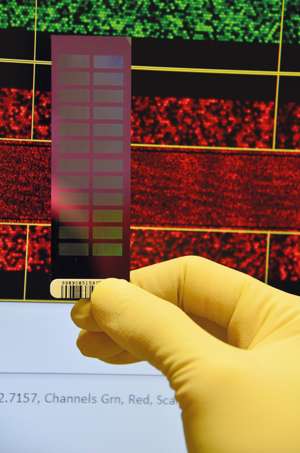A genome scan chip, which has been loaded with a person’s DNA. The screen in the background shows the output from a genome scan. A*STAR Genome Institute of Singapore
A study looking for links between genes and susceptibility to enteric fever has found that people who carry a specific version of a gene are nearly five times less likely to have the disease. This finding by an A*STAR-led team could lead to better vaccines to prevent the serious disease, also known as typhoid, that is caused by Salmonella bacteria.
Enteric fever, while rare in the developed world because of better sanitation, is still endemic in many low-income countries. It affects almost 27 million people annually.
The DNA from 432 Vietnamese people with confirmed enteric fever was compared with DNA from over 2,000 Vietnamese free from the illness, in a study led by Chiea Chuen Khor of A*STAR's Genome Institute of Singapore and Sarah Dunstan of the University of Melbourne, Australia.
People who had a particular variant of the HLA-DRB1 gene were nearly five times less likely to have enteric fever than those without it, the researchers found. This gene codes for a protein that displays molecules from foreign organisms on the surface of human cells (known as antigen presentation), which enables the immune system to learn to recognize and fight them.
"These results tell us that HLA-DRB1 is very important in combating infection from Salmonella typhi and Salmonella paratyphi, the bacteria which cause enteric fever. It could provide valuable insights for improving the existing vaccine design for S. typhi, which has only limited efficacy, and developing a vaccine for S. paratyphi, for which no vaccine currently exists," says Khor.
Khor had a hunch that a gene from the human leukocyte antigen (HLA) family might prove important. "For diseases of infection, immunity or inflammation there is usually no half-way house with HLA. Most of the time, you see either a very strong association or no association at all."
Much is known about the genetics of the Salmonella bacteria and how they cause disease, but, until this study, little was known about how human genetics affects response to the infection, says Khor.
As with many genes, there is a trade-off—"the same version of the gene that protects against enteric fever is also known to increase susceptibility to autoimmune and inflammatory diseases such as rheumatoid arthritis and Crohn's disease," he warns.
Salmonella infection can lead to a variety of conditions, of which enteric fever is the most serious. It is caught by consuming fecally contaminated food or water and is fatal in 10–25 per cent of patients without access to antibiotics.
More information: Variation at HLA-DRB1 is associated with resistance to enteric fever. Nature Genetics 46, 1333–1336 (2014). dx.doi.org/10.1038/ng.3143
Journal information: Nature Genetics
























